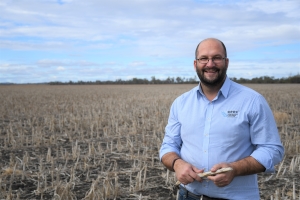
Future-focused, climate-research will be one of the issues firmly in the spotlight at the 2020 Grains Research and Development Corporation (GRDC) Grains Research Update in Goondiwindi.
Research which suggests wheat yield gains caused by higher carbon dioxide levels may offset losses caused by rising temperatures and reduced rainfall, will be presented by Agriculture Victoria senior scientist Dr Glenn Fitzgerald at the annual Updates on March 3 and 4.
His presentation is based on findings from a long-term study that tested grain production in atmospheric conditions that simulated elevated carbon dioxide environments.
It found that wheat yields increased, by an average of 25 per cent, in a semi-arid environment when carbon dioxide (CO2) was increased from present-day levels of about 400 parts per million to 550ppm – the projected rate in 30 years.
The Australian Grains Free Air CO2 Enrichment (AGFACE) Project was led by Dr Fitzgerald and involved Agriculture Victoria and the University of Melbourne.
“Carbon dioxide is one of the fundamental ‘food sources’ for plants. It affects everything about plant growth and development, as well as plant uptake of nitrogen, water and minerals, so it has a lot of ramifications,” he said.
Dr Fitzgerald will explain the outcomes in more detail as the first speaker on day one of the Goondiwindi event.
Also speaking on increasing climate variability will be Dr Steven Crimp, a climate applications scientist with the Climate Change Institute at the Australian National University.
Dr Crimp said changes in rainfall patterns were less certain, but the forecast was for a decline, which coupled with projected warmer temperatures was likely to increase evaporation.
“Combining, these factors with increasing climate variability will place a significant drag on crop yield despite some offset resulting from more efficient photosynthesis as a result of increased CO2 levels,” Dr Crimp said.
In conjunction with the Goondiwindi GRDC Update this year a new, free session will be held for graduate and early career agronomists.
An initiative of the GRDC the Emerging Agronomists Network session is designed to help agronomists develop their ‘soft skills’ in areas like negotiation, communication with difficult clients and conflict management.








